Chapter

Criticisms of White Western Evangelicalism and the Religious Right
The speaker discusses their experiences with conflicting messages surrounding the breakdown of the family and black fatherlessness in white western evangelicalism. They also touch on the disconnect between the religious right's views on crime and poverty and the reality of survival crimes.
Clips
Banfield believed cities were criminal and ought to be abandoned, while Wilson believed they could be great again if the decline was properly recognized and blamed liberal politicians and moral failings of black communities for the decline.
1:25:06 - 1:26:24 (01:18)
Summary
Banfield believed cities were criminal and ought to be abandoned, while Wilson believed they could be great again if the decline was properly recognized and blamed liberal politicians and moral failings of black communities for the decline. Both agreed that punitive social control mechanisms were necessary to restore order and stability in the neighborhoods.
ChapterCriticisms of White Western Evangelicalism and the Religious Right
EpisodeBehind the Police: How Police Unions Made Cops Even Deadlier
PodcastBehind the Bastards
The speaker talks about growing up in the church and realizing that the white western evangelical teachings were racist and led to a crisis of faith.
1:26:24 - 1:28:42 (02:18)
Summary
The speaker talks about growing up in the church and realizing that the white western evangelical teachings were racist and led to a crisis of faith. They also mention the racism within the scientific community and references Charles Murray and his co-authoring of The Bell Curve with Richard Hernstein, which espouses racist ideology.
ChapterCriticisms of White Western Evangelicalism and the Religious Right
EpisodeBehind the Police: How Police Unions Made Cops Even Deadlier
PodcastBehind the Bastards
Broken windows policing shifted the focus of preventing crime to punishing minor criminal behavior, which ultimately led to the justification of aggressive and invasive forms of policing that disproportionately targeted non-white communities and perpetuated social inequality.
1:28:42 - 1:30:06 (01:23)
Summary
Broken windows policing shifted the focus of preventing crime to punishing minor criminal behavior, which ultimately led to the justification of aggressive and invasive forms of policing that disproportionately targeted non-white communities and perpetuated social inequality.
ChapterCriticisms of White Western Evangelicalism and the Religious Right
EpisodeBehind the Police: How Police Unions Made Cops Even Deadlier
PodcastBehind the Bastards
This podcast episode discusses how our justice system works against individuals who are already vulnerable due to poverty and how laws can be unjust.
1:30:06 - 1:31:58 (01:52)
Summary
This podcast episode discusses how our justice system works against individuals who are already vulnerable due to poverty and how laws can be unjust.